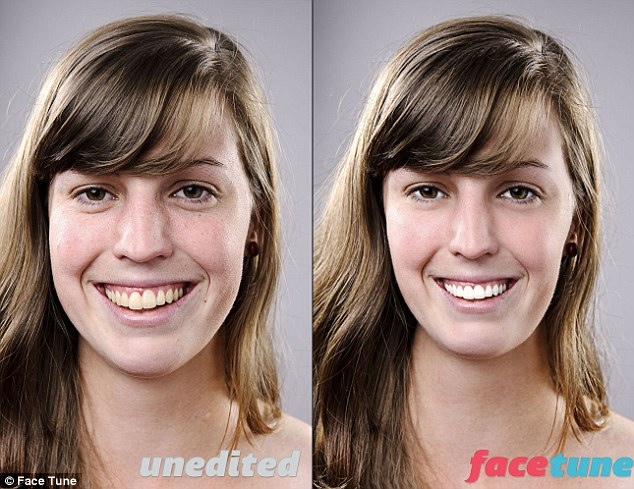By Margretta Sowah
We all know there is no shortage of Photoshop type apps which promise “flawless skin” and “picture perfect results.” If beauty is the standard, what is premium and, more importantly, what is inferior? Is it being overweight and courting bad skin or is it not having the prized stereotypical model features? (Cindy Crawford deserves to be unique; stay away from that pencil for good!) Whatever it is, we equate being beautiful with being successful. Is it like that old adage of if you are optimistic you are therefore happier? Does beauty, whether true or false, lead to higher self-esteem? We all know how we feel when we just get our hair buffed and fluffed; prancing out of the salon – ready to take over the world, or at least the nearest bar.
Facetune is a physical enhancement application that launched in 2013. It promises “exact results, for one and all […]” and that we, as conscious consumers, “don’t need to wait for the perfect shot!” – Heaven forbid we spend more time offline than on. This concept is understandable. What the market wants, the market gets. However let’s not confuse what is convenient with what is appropriate. With stats like 46k and counting on Facebook as well over 1000 on Instagram; what could possibly be the problem with an App like this?
For one thing; what is the message being expressed by its makers? And is it relating with the experience us users are creating? Many of us are quick to stand up and say “Models are too thin! We need to be more health conscious!” And so on but what about on our own continual Fashion Show – Life? We are essentially promoting ourselves when we are on Social Media sites; putting in taglines and our finest selfies, but are we really ready for our close-ups?

Attention comes in different forms and, sadly, leaves in just as many. In the digital age we all crave this luxury. Others have tried to buy it – (sell and swap) but the most prevalent currency is beauty. The digital revolution has been at the forefront of psychological and sociological studies to do with esteem and what we deem as personal value – the chicken and the egg theory.
Any company worth its salt know that with the right implementation they can rake in some serious De Niro because of these new insights. This concept seemed near impossible a decade ago when Facebook could have been a euphemism for a photo album. The rise of Social Media means customers are at the forefront of businesses… and by customers I mean celebrities and personas.
 Celebrities have been called out for Photoshopping Instagram pictures – badly (Miranda Kerr and, yes, even Queen B) which are all said to be because of an unsuspecting intern. We can’t blame magazines for this image of perfection or even the Fashion Industry because if we travel across the globe there are different staples of beauty and idealism. We can’t blame Facetune either for giving us this platform so ‘with the tiniest bit of effort anyone can achieve great looking photos’.
Celebrities have been called out for Photoshopping Instagram pictures – badly (Miranda Kerr and, yes, even Queen B) which are all said to be because of an unsuspecting intern. We can’t blame magazines for this image of perfection or even the Fashion Industry because if we travel across the globe there are different staples of beauty and idealism. We can’t blame Facetune either for giving us this platform so ‘with the tiniest bit of effort anyone can achieve great looking photos’.
With appropriately named Silicon Valley app creators; it seems these digital entrepreneurs are delivering on their promise (their end of the bargain) to give average consumers, like you and I, an avenue to protected perfection. Promoting a beautiful life is no doubt trendy – as it does not produce disappointment. The principle of branding is to sell a promise – an ideal that those who purchase will in fact receive benefits. There is also the “group factor” where we all want to be a part of something; and we all are. Does an App like this promote togetherness or is it supporting a fake ideal of a subculture of beauty? Let’s rephrase; where there is no buyer, there is no seller.
It ultimately comes down to a moral decision for the end-user. Much like almost everything we buy; there needs to be a consideration for whether its #iWant or #iNeed. People don’t buy products for features; they purchase benefits and emotional meaning.
The benefit of an App like this is being able to place your “best face” forward. But is it actually YOUR face? Sure, it looks like you, sounds like you, smells like you (if that’s what your into) but is it a real representations of you – meaning if someone was to meet, let’s say, Alice, at a cafe after engaging in Social Media friending acrobatics, would Alice be as Alice is? Or would you be shocked (disappointed) to find that Alice’s eyes aren’t blue, they are brown. And Alice doesn’t have a beauty mark on her face or another part of her body, for that matter. Alice still is the twenty something fun-loving, yoga practicing, corporate working, Starbucks drinking woman you were impressed with. Only now she is a bit taller than anticipated and her clothes are a bit tighter than you recall.
Is it Alice that is lying, or is she putting on her “Autotune” to attract the best as she would with makeup or hair extensions?
Now, I don’t see anything wrong with that but I don’t see much right with it either.












